Apple pie is one the very best desserts that almost every person has eating or tried. It is considered to be very American and it typically is eaten around the American holidays such as Thanksgiving and Christmas. For the past four years it has been a tradition for my daughter to make an apple pie for these occasions and I will share her process with you! But first it would be nice to know the history and nutrition of the apple before we know the apple pie. In the end, the goal is to get folks to eat an apple and to find fun ways to become healthier.
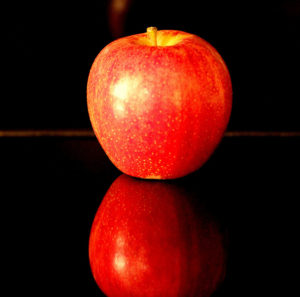
Photo by Lisa Engle – Flickr
As I presented in class, apples are the backbone of apple pie but they also have a very old history. Apples weren’t always in America; they have made their way to this great country just like many immigrants who came through Ellis Island. At first in America, we had the crab apple but our modern apples probably came from Asia and we can thank Alexander the Great for finding the dwarfed apples in Kazakhstan then bringing them back to Macedonia in 328 BC (Upton, 2013). In the book Apple: A Global History it mentions “Alexander brought gardeners skilled in grafting from the Tigris basin to Greece to assist in the production of apples (Janik, 2012, p. 17).” Apples were on their way! The Romans shared them with England and eventually to onto America via the colonist (Upton, 2013). One of the more interesting fact of our native apple trees is how they were pollinated. Although the seeds were planted the tree did not bear much fruit. So, along comes the Apis mellifera or the European honey bee, shipped to American in 1622, and these bees really enjoyed pollinating because they produced honey 50 times more than our native bees (Upton, 2013). This was the kick-start the trees needed to become part of Americas snack, meals and desserts.
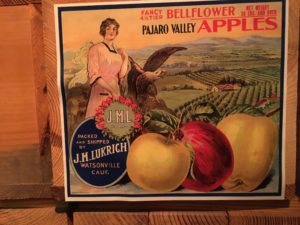
Photo by Scott Paulsen – Smithsonian National Museum of American History
The symbolism off apple to Americans derive from the slogans used to promote patriotism and capitalism. A common reply to a journalist as to why men and boys would want to fight in WWII was “For mom and apple pie” (Upton, 2013). Today that slogan would not work but people in were less knowledgeable as today and we need a much better reason to fight in a war than apple pie. Another slogan giving by the apple growers was “An apple a day keeps the doctor away” which was a very smart campaign to get apples into your grocery cart and it also gave the industry the monetary boost it needed because of the negative press of prohibition hard cider (Upton, 2013).In the early 20th century, catchy slogans were very necessary to keep products moving and although, nutritionally, apples speak for themselves the statements made to the public while eating an apple told people that they supported our troops and prohibition.
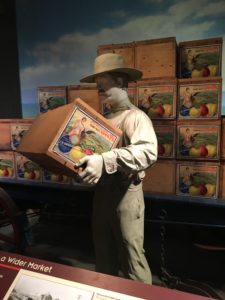
Photo by Scott Paulsen – Smithsonian National Museum of American History
As America was being developing people like pioneer Johnny Chapman aka Johnny Appleseed helped people to settle the land. John Chapman, born in Massachusetts in 1774, is said to have had a belief of a Swedish mystic named Emanuel Swedenborg. This belief was that every plant and animals in nature correspond with particular truth and so he wandered through the wilderness of Pennsylvania, Ohio, Illinois and Indiana planting apple seeds (Janik, 2012, p. 47). He was odd and it noted that he was barefoot wearing a sack and a pot on his head.
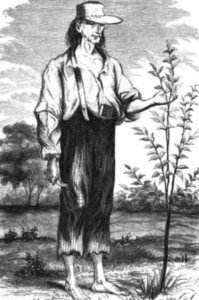
The Real Johnny Appleseed Brought Apples—and Booze—to the American Frontier
Although, Appleseed had an important impact on the spread of apples he also had an impact on helping settlers with their land. In an effort to further land development or occupation by settler’s, congress passed the Pennsylvania Land act of 1792. This act allowed people to purchase warrants of 400 acres of land but the land had to be surveyed then settled within two years of purchase (Kerrigan, 2012, p. 51). This act was interesting because, as noted by Kerrigan, the people who profited most from this act were not the local citizens but the political friends and allies who were giving the chance to accumulate wealth through land speculation. This type of political land manipulation reminds me of the restrictive covenants of the 1930s whereas people profited vastly over time due to the inability to purchase a piece of property. Most of the land was bought by companies like the Holland Land Company and the investors soon realized that to turn a profit on title transfers the land had to both safe and settled. The Holland Land Company hired people like Johnny Appleseed for his labor and he ultimately he helped the company to sell the land to local settlers (Kerrigan, 2012, p. 59). Johnny Appleseed helped these companies to sell their land to people and his quirkiness made him a legend.
We all know apples are good for you but how good are they and what kind of things do that help to prevent. On average an apple contains about 52 calories, .26 grams of protein and 13 grams of carbohydrates (Nordqvist, 2017). Eating an apple may not be the most filling but a cold apple can be incredibly refreshing and I tend to eat them cold from the refrigerator. There are many nutrients that go into an apple but the important ones are Vitamin C, B-Complex such as riboflavin, thiamin and vitamin B-6, Dietary fiber and Phytonutrients (Nordqvist, 2017). Getting enough of these vitamins is hard enough due to the type of foods that are cheaper and easier to find such as potato chips or even McDonalds. For many of us if we didn’t find an apple or a banana at Starbucks then we wouldn’t get any fruit for a month.
The other benefits of the apples are much more incredible because they will make your body work better and prevent neurological decay. In a 2006 study from the Experimental Biology and Medicine an important antioxidant found in apples is quercetin which helps to reduce cellular death caused by oxidation and inflammations of neurons (Nordqvist, 2017). Also, in another study from the same conference it was noted that apple juice increases the production of a neurotransmitter that improves memory. Adding this piece of fruit to your diet will also help to prevent dementia and reduce your risk of stroke. According to the Medical News Today researchers found that apples can protect neuron cells against oxidative stress-induced neurotoxicity which helps to reduce disorders such as Alzheimer’s disease (Nordqvist, 2017). After reading about the stroke data and having a family member pass away from a stroke I am going to make sure eat more apples are eating or available at my house.
Other benefits from eating apples are cholesterol improvement, reducing the risk of diabetes, and helping to prevent breast cancer. Studies from a group of researchers at the The Florida State University stated that apples are a ‘miracle fruit’ and older women who ate apples everyday had 23% less bad cholesterol (Nordqvist, 2017). Truly eating an apple a day may keep the doctor and the cholesterol away.
Apple go into too many dishes from apple fritters to apple sauce but a main dessert that many of us has have eating is the apple pie. In my family, my daughter makes our holiday apple pie from a scratch recipe used by both her mother and her grandmother. The main differences between their recipes and most is the crust. The crust is the hardest part of this process and tends to be the most frustrating because I can personally say that many an argument has done because of a bad crust. Although the recipe is a base and it can be altered to taste.
Ingredients: Apple Pie Filling
6 apples – 2 Granny Smith and 4 Fiji
2/3 cup granulated sugar
2 tablespoons fresh lemon juice
1 tablespoon fresh lemon juice
6 tablespoons salted butter
2 table all-purpose flour
1 teaspoon ground cinnamon
½ teaspoon of nutmeg
¼ teaspoon of ginger
¼ teaspoon cloves
Ingredients: Pie Crust
2 ½ cups of all-purpose flour
2 teaspoons of sugar
2 sticks of salted butter, cut into small pieces
1 egg for top wash
Directions for pie crust and filling
The first thing we need to make is the pie crust and we will do this by first combining both the flour and the sugar in a large bowl. Make sure the butter is not melted but cold and refrigerated. Add the butter slowly into the bowl and mix with your hands until it turns into dough. It will start out like little crumble balls and you will need to create a large dough ball. Cut off and set aside about a quarter amount of the dough and save for the top of the pie. Layout enough parchment paper to hold the dough ball and start to roll into a flat ¼’ sheet large enough to cover the pie tin. You may need to sprinkle a small amount of flour to prevent the roller from sticking. Lift up the parchment paper with the dough and put it over the pie tin then peel off the paper. Using a fork poke a few holes into the dough, this will prevent the dough from the creating a bubble. This is also the time to decorate the top edges of the pie with a fork. Bake at 285 for 8 to 10 minutes or until slightly brown. You will need to watch this process because you don’t want the crust to burn.
The filling is simpler and will require a bowl and pan to cook the filling. Using a potato peeler, peel and core the apples then cut them into four wedges. Dice the wedges and place them into a large water bowl with the lemon juice this prevents the apples from browning while the other parts of the recipe are being prepared. In a pan add the butter and turn in the heat on low to melt. Add 1 tablespoon of lemon juice, sugar and spices and stir mix well. The mixture should be thin and at this point you will want to add a small amount of flour to thicken slightly. Turn off the fire under the pan or remove the pan from the stove to let the mixture cool. This should take around five minutes to ten minutes. Use this time to drain your apples thoroughly. After at least five minutes add the apples to the mixture and mix well.
Add the apple filling to the pie crusted tin and set aside. Get the pie dough that you set aside and layout some parchment paper. Roll out the dough using a dusting of flour to prevent any sticking then cut into one inch strips. We use a pizza cutter. Add the strips to the top of the pie in a lattice style type of decoration. Egg wash the top of the strip because this prevent them from burning while the pie is cooking. Place pie in the oven at 375 for about 40 minutes or until the pie golden brown. The pie filling should be slightly bubbling. Wait at least an hour before eating or you can severally burn yourself. Apple pie is a common holiday dessert in our family and we often come together to make it along with other treats. I hope you and your family can come together to make a delicious treat.
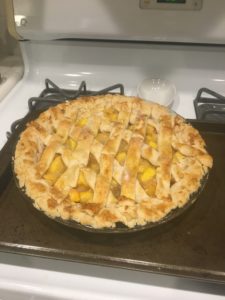
Photo by Scott Paulsen
References
Geiling, N. (2014, November 10). The Real Johnny Appleseed Brought Apples—and Booze—to the American Frontier. Retrieved from www.smithsonianmag.com: https://www.smithsonianmag.com/arts-culture/real-johnny-appleseed-brought-applesand-booze-american-frontier-180953263/
Health Benifits Times. (n.d.). Apple pie facts, benefits and precautions. Retrieved from Health Benifits Times.com: https://www.healthbenefitstimes.com/apple-pie/
Holly. (2015, March 22). APPLE PIE CUPCAKES. Retrieved from Spend with Pennies: https://www.spendwithpennies.com/apple-pie-cupcakes/
Janik, E. (2012). Apple : A Global History. London: Reaktion Books, Limited.
Kerrigan, W. (2012). Johnny Appleseed and the American Orchard : A Cultural History. Baltimore: Johns Hopkins University Press.
Nordqvist, J. (2017, April 11). Apples: Health benefits, facts, research. Retrieved from Medical News Today: https://www.medicalnewstoday.com/articles/267290.php
Upton, E. (2013, July 11). Apple Pie Isn’t Really “American”. Retrieved from Todayifoundout.com: www.todayifoundout.com/index.php/2013/07/apple-pie-isnt-really-american/
